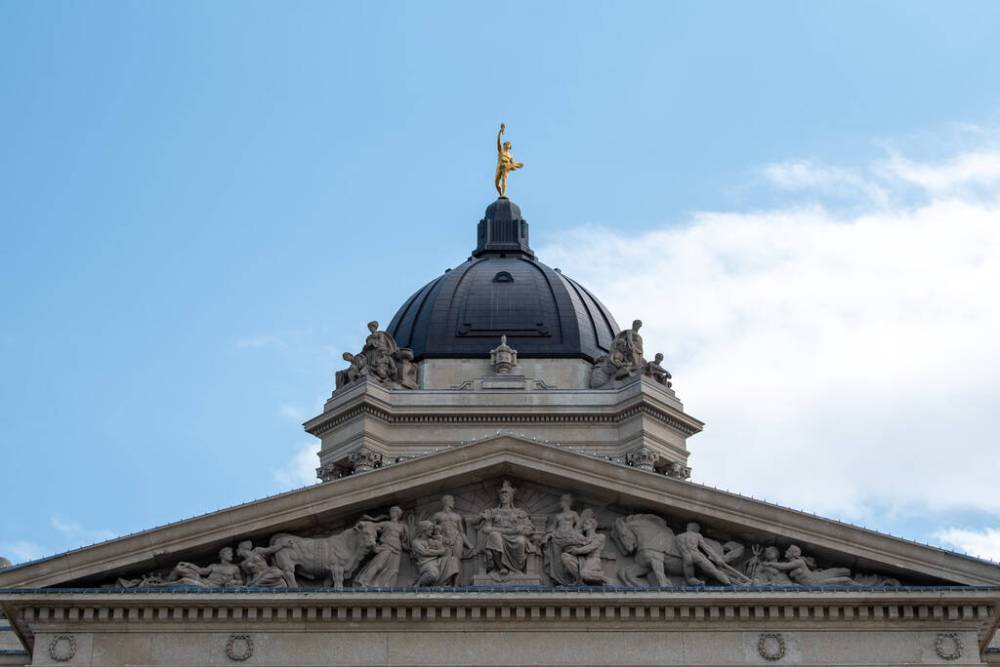
The rookie NDP government’s legislative agenda comes to a head Monday as 21 key bills are set to receive royal assent, including a law that limits protests at abortion clinics and another that would make adult education an option for welfare recipients.
After a combative session, including an especially nasty question period last week when MLAs accused each other of hateful behaviour as they debated a bill to mark March 31 as a day to celebrate transgender and two-spirit people, the Manitoba legislature is set to break for the summer. MLAs will retreat to their constituencies to get face time with voters as they attend barbecues and community events.
The Tories accused the government of having a light legislative agenda, but Premier Wab Kinew denied the characterization.
Manitoba MLAs are set to retreat to their constituencies to get face time with voters as they attend barbecues and community events. (Alex Lupul / Free Press files)
“The thing we’ve been trying to build our internal culture around is being a listening government. So we started with our commitments from the election on health care and affordability, and as we go, we’ve had to manage a pipeline shut down, an early start to the wildfire season and the situation and Birchwood Terrace,” Kinew said Sunday.
The premier noted the New Democrats would “have to do a lot of work over the summer” despite the legislative break.
He pointed to the provincial budget as evidence of his government’s commitment to make good on campaign promises.
“To bring in a budget that has big investments in health care, that has an extension to the gas tax cut and other affordability measures is very good for the province and meaningful for us on a personal level,” he said.
Some bills expected to become law Monday
Bill 5: The Adult Literacy Act requires the minister to develop, implement and evaluate an adult literacy strategy. It requires organizations that offer adult literacy programs to meet certain criteria to receive provincial funding.
Bill 6: The Manitoba Assistance Amendment Act requires adult education to be considered as a legitimate path to work for Manitobans who receive social assistance payments. Currently, some Manitobans enrolled in Employment and Income Assistance must meet work expectations to remain eligible for full benefits.
Bill 5: The Adult Literacy Act requires the minister to develop, implement and evaluate an adult literacy strategy. It requires organizations that offer adult literacy programs to meet certain criteria to receive provincial funding.
Bill 6: The Manitoba Assistance Amendment Act requires adult education to be considered as a legitimate path to work for Manitobans who receive social assistance payments. Currently, some Manitobans enrolled in Employment and Income Assistance must meet work expectations to remain eligible for full benefits.
Bill 8: The Safe Access to Abortion Services Act creates access zones at clinics and facilities that provide abortions and bans activities that would persuade someone against abortion, express disapproval or continuously observe people within a minimum 50 metres of a designated site. It imposes fines of up to $10,000, or a jail sentence of up to a year, for repeat offenders.
Bill 10: The Advanced Education Administration Amendment Act allows the government to reduce funding to an educational institution that fails to adopt and implement a sexual violence policy that meets the requirements of the act.
Bill 34: The Liquor, Gaming and Cannabis Control Amendment Act is amended to allow a person who is 19 years of age or over to grow up to four cannabis plants in their residence. It won’t come into force until a day is fixed by proclamation.
Bill 36: The Regulated Health Professions Amendment Act requires professional bodies such as the College of Physicians and Surgeons of Manitoba to hold public cancellation hearings for physicians convicted of crimes related to suitability to practise.
Bill 17: The Workplace Safety and Health Amendment Act (Advisory Council) reverses legislative changes brought in by the Progressive Conservatives and re-establishes the advisory council on workplace safety and health. The minister-appointed, 13-person group was done away with in 2017.
Bill 20: The Highway Traffic Amendment Act says a person who fails to have an ignition-interlock device installed in their vehicle would no longer be able to appeal the suspension of their licence or their participation in the ignition-interlock program.
Bill 23: The Change of Name Amendment Act (2) requires a criminal record check when an application is made to change a person’s name. The director of Vital Statistics must refuse the change of name if the criminal record check discloses that the person was convicted of an offence that meets criteria set out in the regulations unless an exemption is granted by the minister.
Bill 31: The Captured Carbon Storage Act gives the government the power to regulate how, where, and by whom captured carbon emissions are stored underground.
Bill 33: The Change of Name Amendment Act (3) says the director of Vital Statistics must notify the public when a person changes their name, subject to limited exceptions. The requirement is removed if the reason for the change relates to the individual being transgender, non-binary, gender-diverse or two-spirit Indigenous.
“We’re back in the fall. We’ve got more legislation we’re looking to pass on health care, on some justice initiatives. Over the course of the summer, we are going to be rolling out the first steps of the budget measures on health care.”
As per the rules of the house, the official Opposition can hold back as many as five government bills until the fall.
The Tory party decided to delay four bills, including one that would require huge public construction projects to use unionized workers, and another that would require children to attend school as of age six. Currently, children must attend school as of age seven, and the Tories want to know the effect of the change on school enrolment.
In a session highlighted by acrimony over rising crime rates, Bill 30 was introduced to make it easier for law enforcement to seize the proceeds of crime, something Manitoba has done since 2009 that helps pay for anti-crime measures. The proposed law, which will receive royal assent Monday, raises the maximum amount of property that can be forfeited to $125,000 from $75,000.
The court can order a person to provide information about how they acquired property or an interest in property if it appears that their known sources of income and assets would not be sufficient to do so and if the person or a closely-related person have been involved in unlawful activity. If they don’t, or provide false or misleading information, the property is presumed to be proceeds of unlawful activity unless proven otherwise.
The government focused on literacy, welfare reform, sexual violence policies at universities and safe zones around abortion clinics, in its first legislative session and it brought in measures to refresh language used in provincial laws so they are gender-neutral.
Tories delay four proposed laws till fall
Bill 7: The Public Sector Construction Projects (Tendering) Repeal Act would require major, publicly funded construction projects to use unionized labour. The PCs called it “reckless” and said it repeals legislation that levelled the playing field for all bidders on government construction projects.
Bill 9: The Employment Standards Code Amendment Act would extend protected sick leave for Manitoba workers to 27 weeks from 17 weeks. The Tories said there needs to be further consultation with business owners and industry.
Bill 7: The Public Sector Construction Projects (Tendering) Repeal Act would require major, publicly funded construction projects to use unionized labour. The PCs called it “reckless” and said it repeals legislation that levelled the playing field for all bidders on government construction projects.
Bill 9: The Employment Standards Code Amendment Act would extend protected sick leave for Manitoba workers to 27 weeks from 17 weeks. The Tories said there needs to be further consultation with business owners and industry.
Bill 16: The Regulatory Accountability Reporting Act and Amendments to the Statutes and Regulations Act seeks to undo some of the red-tape regulatory changes enacted by the Pallister government. The new legislation sets out to streamline government and make it more accessible, reduce red tape and give the public opportunities to provide input on regulations, the NDP said. The PCs said it will result in less accountability and transparency.
Bill 21: The Public Schools Amendment Act would lower the compulsory age for school attendance to six from seven starting in the 2025-26 school year. The Tories want to know how many more students will be added to the public school system by lowering the age at which they must attend, and what the plan is to enhance school capacity when student populations surge across the province.
On another front, the NDP took a crack at tackling an emerging issue: fake intimate images created by technology that appear to depict identifiable people. Bill 24, another set to become law Monday, would allow the person depicted to sue the perpetrator who distributes the image without their consent.
A good chunk of Kinew’s legislative agenda was tucked into an omnibus budget bill that won’t see the light of day until after MLAs return to the house Oct. 2.
That includes doubling the amount of expenses political candidates can be reimbursed, giving the cabinet the authority to raise the gas tax, changing the environmental act, and tweaking labour laws to favour unions, while creating a seniors advocate.
Unlike most proposed legislation working its way through the legislative process, Manitobans won’t have a chance to weigh in on any of it at the committee level.
The Budget Implementation and Tax Statutes Amendment Act 2024 is not required to be heard at a committee before becoming legislation.
“All of these bills have been tacked onto the back of (the budget law), which is unprecedented in Manitoba,” said Progressive Conservative caucus chair Derek Johnson.
“If you look at the scope and the scale of what’s being forced through in this budget bill, that is a major concern for Manitobans,” added Tory finance critic Obby Khan.
When the PCs were in power, they were called out for the same tactic. In 2020, a section of the bill prevented the province from being sued for clawing back the federal allowance given to children in care.
Veteran political analyst Paul Thomas said the legislative assembly’s rules committee could put an end to the misuse of the budget bill but probably won’t unless there’s an “uproar” from backbenchers and the public.
“There is little incentive for the two main parties, which take turns governing, to voluntarily impose constraints on the use of such bills which are a politically convenient way to expedite the passage of multiple items, especially contentious provisions,” said Thomas.
—with files from Tyler Searle

Carol Sanders
Legislature reporter
Carol Sanders is a reporter at the Free Press legislature bureau. The former general assignment reporter and copy editor joined the paper in 1997. Read more about Carol.
Every piece of reporting Carol produces is reviewed by an editing team before it is posted online or published in print — part of the Free Press‘s tradition, since 1872, of producing reliable independent journalism. Read more about Free Press’s history and mandate, and learn how our newsroom operates.
Read full biography
Our newsroom depends on a growing audience of readers to power our journalism. If you are not a paid reader, please consider becoming a subscriber.
Our newsroom depends on its audience of readers to power our journalism. Thank you for your support.


